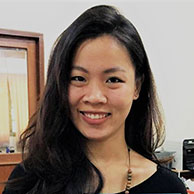Conversation with Mixed Migration Center (MMC)
In this session, we welcome Hanh Nguyen from the Mixed Migration Center (MMC). Hanh Nguyen is a researcher at the MMC Asia Regional Hub. Before joining MMC, Hanh was a research associate with ASEAN-USAID PROSPECT examining human trafficking in the fisheries sector, a policy consultant at the Global Green Growth Institute in Vietnam, and a student consultant with the European Bank for Reconstruction and Development in Hungary. Her research has a strong emphasis on reflecting pressing development issues while providing feasible policy recommendations. Hanh recently won the Decent Work prize of the International Labour Organization for the best research paper by an emerging scholar.
Within this session, Hanh explained mixed migration as the mixed irregular movements of people, including refugees, asylum seekers, victims of human smugglers and trafficking, also convict migrants looking for better opportunities. All these people in mixed migration movements are entitled to international protection under international human rights law. However, in reality, people who move irregularly are the most susceptible to protection risks.
MMC initiatives collect data from refugees, asylum seekers, and migrants. They currently have two different surveys going on: core migration surveys in Indonesia, Malaysia, and India, and returnee surveys in Afghanistan. Returnee surveys attempt to look into Afghans’ experiences and challenges upon returning to their home country from Iran and Pakistan. Surveys in Afghanistan have been undergoing since October 2016, followed by India and Indonesia in January 2017, and later Malaysia in October 2018. MMC tries to fill in the gap by conducting in-depth research and capturing migrants’ experiences during movement, experiences in host countries, and their drivers for migration. MMC also asks questions about what kinds of barriers are faced by migrants in accessing public healthcare, education, earning income, and acquiring social integration.
The reasons for choosing countries and cities of research derived from the rationale of migration dynamics complexity. Especially due to the attribution that chosen countries are non-signatory countries to the 1951 Refugee Convention, which in consequence doesn’t oblige them to provide protection for refugees.
Hanh Nguyen also shared her insights on how refugees’ perception of transit cities, destination cities, and returning cities affect their perception of acceptance and the expected well-being of their livelihood. In their surveys, MMC asked two important questions: (1) Whether they have reached their destination country yet and (2) Whether they see their final destination as their second home or not.
Hanh Nguyen voiced out her concerns on the ever-changing political and economic landscape which affects the unsteady prediction of refugees’ protection due to the lack of national and regional frameworks. As a consequence, protection in different non-signatory countries may vary, especially for undocumented people and people with no nationality status. She mentioned that there is a common false perception that ASR and migrants who fled their country to avoid persecution can only deserve to survive. However, Hanh believes that surviving is not enough; their rights to thrive, to have basic access to healthcare, education, shelter, and income should be protected as well.
Finally, Hanh Nguyen also shares MMC’s increasing interests towards climate change-induced displacement. In the future, Hanh thinks there will be a lot more climate change hub innovation due to its emergence and how important it is to foresee this trend before it is too late.
Any comments or suggestions? Send it to us in written or audio format here, Instagram @rdiuref, or email to info@rdiuref.org





 Hanh Nguyen is the researcher of the Mixed Migration Center (MMC), under the Danish Refugee Council. Before joining MMC, Hanh was a research associate with ASEAN-USAID PROSPECT examining human trafficking in the fisheries sector in five Southeast Asian countries. Hanh recently won the Decent Work prize of the International Labour Organization for the best research paper by an emerging scholar.
Hanh Nguyen is the researcher of the Mixed Migration Center (MMC), under the Danish Refugee Council. Before joining MMC, Hanh was a research associate with ASEAN-USAID PROSPECT examining human trafficking in the fisheries sector in five Southeast Asian countries. Hanh recently won the Decent Work prize of the International Labour Organization for the best research paper by an emerging scholar.